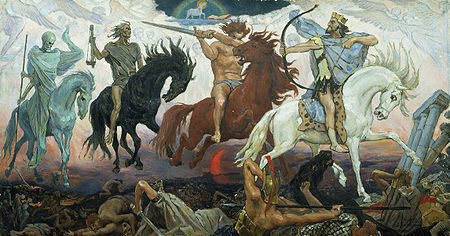A LONGING IN THE BLENT* AIR
Recently, I rented a DVD entitled “The 4 Horsemen,” a conversation by four prominent atheist writers: Richard Dawkins, Sam Harrison, Daniel Dennett and Christopher Hitchens. The topics were varied, the observations thoughtful; but the conversation almost came to a standstill when Hitchens confessed that he hoped religion would never be stamped out entirely. Dawkins, who looked the most astonished, asked why and Hitchens stumbled with his answer. In the end, he fell upon Philip Larkin’s poem “Church Going,” to explain his ambivalent feelings.

(Victor Vasnetson: “Four Horsemen of the Apocalypse”)
When I heard the reference, I blinked for Larkin’s poem is among my favorites. The narrative is about a person who makes a habit of visiting churches when they are empty. He touches the fonts, climbs to the lecterns and imagines the hectoring words of the preacher as they ripple toward the back pews; then he signs the registers and drops a coin in the donation box. As he walks away, he imagines a world where the purpose of churches has been forgotten, where stone walls have turned to rubble or their remains have been buried under grass. Something will be lost, the man admits, though he’s not sure what.
Instinctively, the reader knows what is meant. What will be lost is the dream of belonging to something far greater than ourselves. I belong to no church but I can understand its pull:
“A serious house on serious earth it is,
In whose blent air all our compulsions meet,
Are recognized, and robed as destinies.
And that much never can be obsolete,
Since someone will forever be surprising
A hunger in himself to be more serious,
And gravitating with it to this ground
Which, he once heard, was proper to grow wise in,
If only that so many dead lie round. (Philip Larkin:”Church Going”)
*mingled